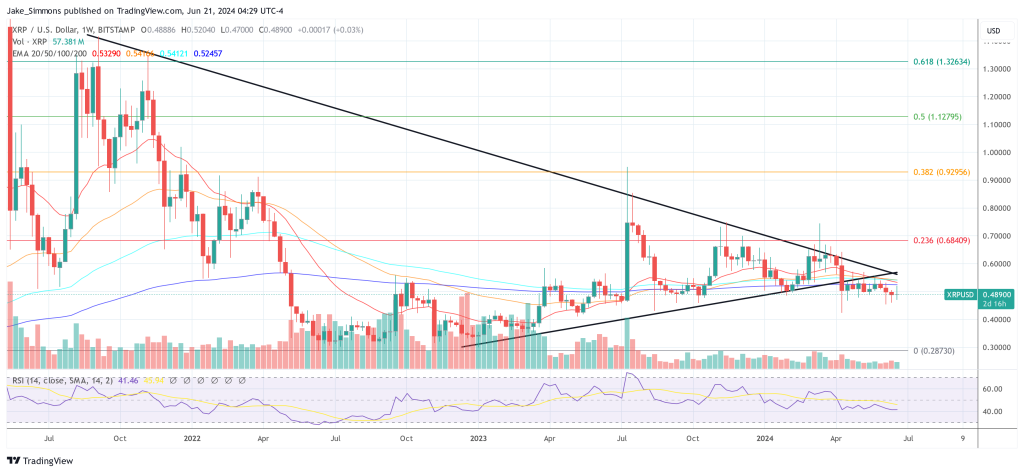On June 20, Ripple Labs Inc. scored a pivotal victory in its ongoing legal challenges, specifically in the federal class action suit filed in the Northern District of California. The case (4:18-cv-06753-PJH), presided over by Judge Phyllis J. Hamilton has been closely monitored by the XRP community due to its potential implications for the classification of the digital asset under US securities law.
Here’s What The Ruling Means For XRP
Judge Hamilton’s ruling granted Ripple’s summary judgment motion, dismissing both federal and state class claims that XRP was sold as an unregistered security. Fred Rispoli, a vocal pro-XRP lawyer, explained the significance of this via social media: “Win for Ripple in the Oakland class action. Judge grants Ripple’s summary judgment motion on federal class claims for unregistered securities as well as the state law securities claims. But these were procedural wins.”
Although Ripple has successfully dismissed the class action claims, the court refrained from making a definitive legal determination on whether XRP constitutes a security. Instead, it was stated that it is for a jury to decide if XRP meets all three prongs of the Howey test, which determines what constitutes a security under US law.
This leaves a substantial part of Ripple’s legal battle unresolved, as Rispoli noted: “The class action is now over at the district court level. As to whether XRP is a security, however, the Court held it is for a jury to decide whether all three prongs of the Howey test are met.”
Rispoli added, “that claim, an individual claim by one plaintiff, will go to trial though in all likelihood, will settle given the extremely low damages and very bad jury verdict that could result if plaintiff wins. To sum up: Court says whether XRP is a security in the context of retail buyers on an exchange is for the jury to decide and not a matter of law.”
The opinion has sparked varied responses from other legal experts. Marc Fagel, another lawyer in the crypto sector, pointed out a contradiction with another ruling, suggesting complexities in the legal interpretation of digital assets: “Just read the opinion. Directly contradicts Torres on programmatic sales (though would’ve been more interesting if the court had gone a step further and found them to be securities sales as a matter of law rather than punting to the jury).”
While Ripple has achieved a procedural victory, the uncertainty over XRP’s classification continues to cast a shadow. Rispoli’s comments underline the limited scope of the ruling: “Sadly, it depends. XRP (via Judge Torres) has legal clarity only (1) as it involves the SEC making allegations of federal securities violations and (2) in the Southern District of New York, which other courts can ignore in non-SEC cases.”
The dismissal of the class action claims against Ripple offers a momentary respite for the company, but the overarching legal questions surrounding XRP and its status as a potential security remain unanswered. The upcoming jury decision on the application of the Howey test to XRP will be crucial.
As Rispoli summarizes, the broader issue at stake is the need for federal legislation to address the regulatory treatment of cryptocurrencies: “Ultimately, crypto world needs to keep pressure on getting federal legislation, because we are on track to having XRP be a security in California but not in New York.”
In-Depth Examination Of The Ruling
The lawsuit involves class action claims against Ripple Labs Inc., its subsidiary XRP II, LLC, and Ripple’s CEO Bradley Garlinghouse. The suit is centered on allegations related to the sale and marketing of XRP, a digital asset, which plaintiffs argue was offered and sold as an unregistered security.
The key issues in the litigation include whether XRP should be considered a security under US law, and consequently, whether Ripple’s actions of selling XRP to the public violated securities laws. This case has seen various legal maneuvers, including motions for class certification, which were granted, allowing the case to proceed as a class action. This means individuals who purchased XRP during a specified period and suffered financial loss can be represented collectively.
In the ruling, Judge Phyllis J. Hamilton made several key decisions.
Points in Favor Of Ripple:
- Federal Claims Dismissed: The court applied the “first-offered” rule under the statute of repose, concluding that the federal securities claims related to the unregistered offer and sale of XRP were barred because the offering occurred more than three years before the lawsuit was initiated.
- State Claims Dismissed: Similar to the federal claims, the state claims for failure to register XRP as a security were dismissed. The court found that the plaintiff did not adequately demonstrate privity, a necessary element for these claims under California law.
- Class Claims Dismissed: The court dismissed all class claims for both federal and state allegations, significantly reducing the scope of the lawsuit against Ripple.
Points Ripple Lost:
- Misleading Statements Claim Proceeds: The court denied Ripple’s motion for summary judgment on the individual claim against CEO Garlinghouse for making allegedly misleading statements about his investment in XRP. This claim will proceed to trial, focusing on whether Garlinghouse’s statements influenced investors’ expectations and investment decisions.
At press time, XRP traded at $0.4890.












